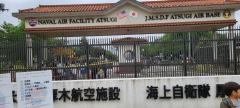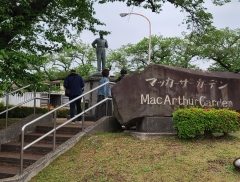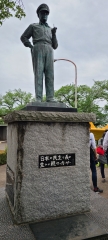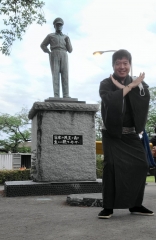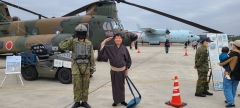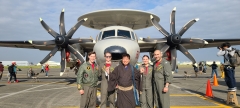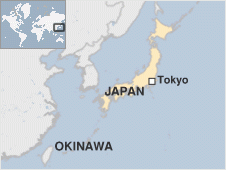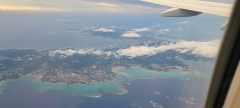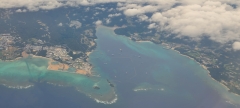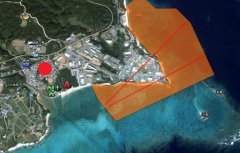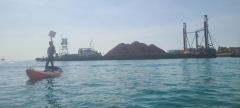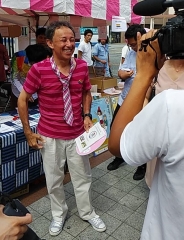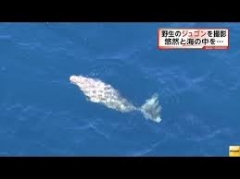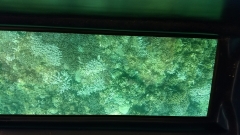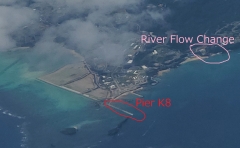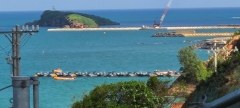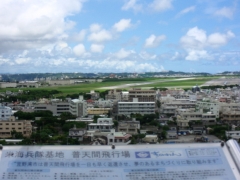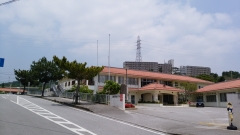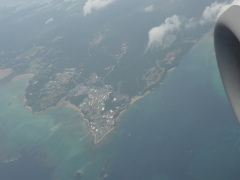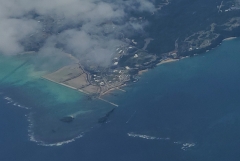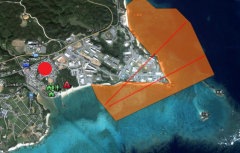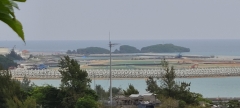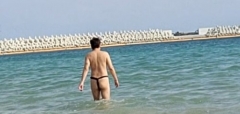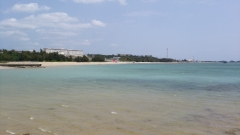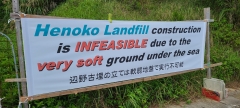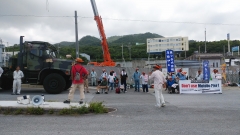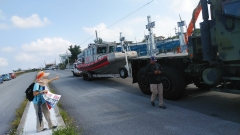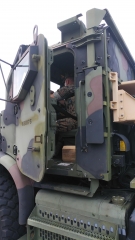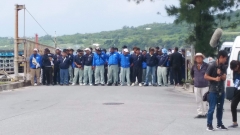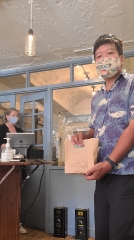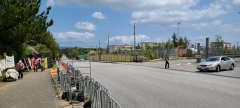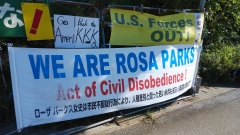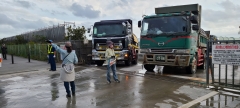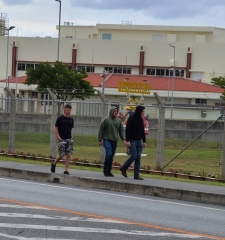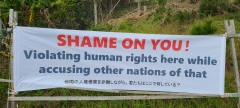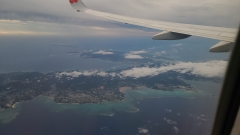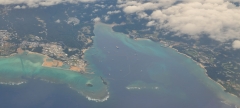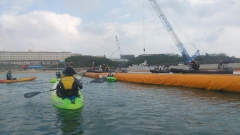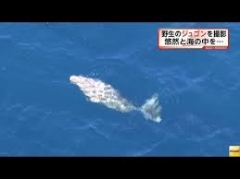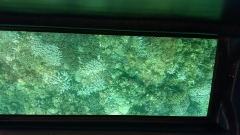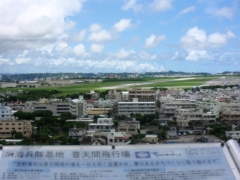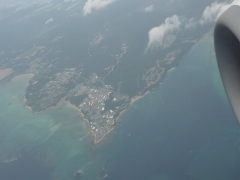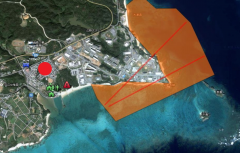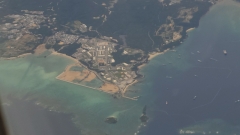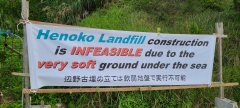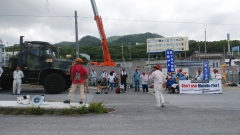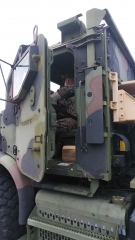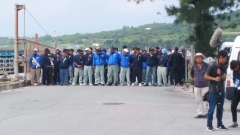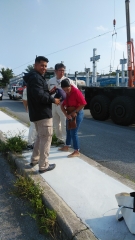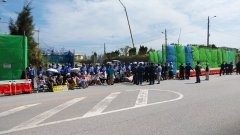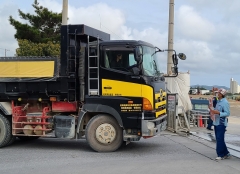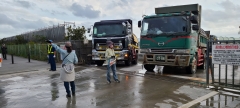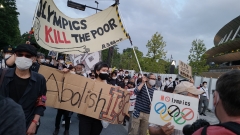25 April 2023
Is MacArthur a parent who gave birth to Japan’s democracy?
Last Sunday I visited Atsugi Air Base in Kanagawa prefecture, an hour train ride from Tokyo. The place is jointly used by both US and Japanese forces. There was an event to exhibit the aircrafts and associate with servicemembers working there.
Near the entrance I saw a very peculiar object. A statue of Douglas MacArthur who was a head of G.H.Q and SCAP organization during U.S. occupied Japan era (1945 to 1952). He entered Japan through this Air Base to occupy the whole of Japan.
What was very peculiar was the description carved below the statue. It was in Japanese, “Nihon-no-Minshushugi-no-Uminooya, MacArthur”, meaning MacArthur, a parent who gave birth to Japan’s democracy.
Is that so?
As far as my knowledge of history, that is partly true but not all true. In my opinion, FALSE.
Yes, during MacArthur era, a current democratic constitution was drafted and announced. Women’s suffrage was enacted. Freedom of speech and expression is protected in the constitution.
Right after the war, Japan was devastated due to the huge loss caused by the war. A lot of people felt betrayed by their own government and military. So MacArthur looked a savior.
However, such democratic movements had existed even before the war between US and Japan started. In 1920’s universal suffrage for men of 25 or over was enacted in Japan’s national assembly as a result of civil movement. In 1930’s women’s suffrage was enacted in the lower house of the national assembly but was rejected in the upper house. In fact, the amendment of the election law to give women’s rights to vote was announced in the national cabinet a few months after the war ended. That was before MacArthur announced the decree to do so and the constitution which bans gender discrimination was promulgated.
During the occupation era in Japan even after the democratic constitution became effective, when Korean War broke out in 1950, the GHQ and SCAP ordered the red purge in Japanese mainstream media outlets without legislation due to fear of rising communism. That was apparently against principle of democracy.
So the statement “MacArthur democratized Japan” was highly debatable.
Japan’s ex-Air Force Chief TAMAGAMI Toshio wrote in his book that he felt very uncomfortable seeing the statue and the description. I felt the same way. Seems like Americans boasting themselves and giving bad impression to us. I would suggest to replace the description plate with one simply stating "In memorial of Douglas MacArthur." That should be appropriate. We don’t respect such arrogant people so the statue did not help better friendship but undermines it.
US military is, in fact doing similar things in Okinawa, Japan as described in this article. I’ve been very angry with them.
In the event I took pictures with Japanese servicemembers and gave a salute to them. I can proudly say “Thank you for your service” to them because they are OUR TROOPS.
With US troops, I was being friendly to them because they themselves are individuals and officially so called “Allied Force”, on which we depend heavily although they are not as helpful as Japanese ordinary citizens expect to be. After all, they are “THEIR TROOPS.”
20:58 Posted in Japan News, Politics, US-Japan relationship | Permalink | Comments (0) | Tags: military, history, democracy
30 September 2022
Dear US Government re: request for stopping USMC new base construction in Okinawa, Japan
Update version of the following letter is posted on June 11, 2024 adding latest information.
Please move to this letter instead of the below.
Dear US President Biden, Congressmembers, Senators and other decision makers of the issue,
My name is MASAGATA, a Japanese man living in Tokyo. I used to study at San Francisco State University, where I majored in International Relations. I am now working as a translator using the English knowledge I acquired in the US.
I am writing this letter to urge US government to discontinue and terminate current ongoing landfill construction project to build a new US Marine base runways at Camp Schwab, Henoko, Nago city, Okinawa prefecture.
This is the modified version of the letter I sent US Congress members and Senators in a joint Armed Forces Committee which was finalizing National Defense Authority Act three years ago and the letter I wrote last March. I added updated information including Russian invasion of Ukraine and the Taiwan crisis to it. I visited Okinawa many times and have been engaged in this issue since 2009.
The below is main points I would like to describe in this letter.
- What has been going on up until now
- Locals strongly oppose the new base construction
- Precious wildlife and ecosystem are threatened
- Technically, physically infeasible project
- America is held accountable for this weird construction project
- Growing doubts about US commitment to Japan’s defense
- Your Servicemen & women and American residents are facing hostility in Okinawa
- Russia and China are watching what America is doing in Okinawa
Some of the below photos can be enlarged by clicking on them.
----------------------------------------------
1. What has been going on up until now
Okinawa is chain of islands and southernmost prefecture below mainland Japan. The climate is subtropical and blessed with abundance of nature surrounded by coral reef. It is 3 hour-flight from Tokyo and very famous for marine leisure tourism just like Hawaii. In fact Okinawa went through the same path as Hawaii did.
Until the end of 19th century it was an independent kingdom but annexed by mainland force. In 1945 US forces occupied Okinawa and then Okinawa has been occupied until 1972, which was 20 years after the mainland Japan regained sovereignty and was the only place that experienced ground battles within Japan, causing 200,000 civilian casualties during WW II.
The current population of Okinawa prefecture is 1.45 million.
In 1996 both the American and Japanese governments agreed to relocate US Marine Corp. Futenma base in Ginowan City, Okinawa to Camp Schwab to get away from the densely populated area around Futenma, together with some of Futenma capabilities to relocate to Guam in the Pacific.
Camp Schwab is on the coastline of Okinawa island, in an area called Henoko.
The relocation plan includes reclamation of the sea to build a new base that consists of two runways and ports expanding existing facility. Schwab is located in between Henoko coast (left) and Oura Bay (right) as you see in the photo taken on May 20, 2021.
The below orange area is the planned reclamation area on Henoko coast. The red lines are runways built on the reclamation area. The red point on the left is local residential area next to the Camp Schwab.
2. Locals strongly oppose the new base construction
Since the plan was announced, locals and activists from all over Japan have been protesting the new base construction by holding referendums, supporting candidates of mayoral and gubernatorial election, and municipal assembly members, who oppose the construction, as well as sit-in demonstration at the gate of Camp Schwab and kayaking at the landfilling site as civil disobedience act. Until now, tens of protesters were arrested and injured by police at the gate or coast of Camp Schwab.
In September 2018, Okinawans elected Denny Tamaki as a Governor of Okinawa after death of then governor Takeshi Onaga, who was opposed to the new base construction. Mr. Tamaki succeeded the will of Onaga and won the election. He was formerly a Diet, Japan’s National Assembly member.
His father was a US Marine serviceman stationed in Okinawa and mother was Okinawan native. It was first time in Japan that a racially mixed man was elected as governor of one Prefecture. He proved that Japan is no longer homogeneous population and the nation can tolerate racial diversity. (Next photo is Mr. Okinawa Governor Denny Tamaki.
In February, 2019, Okinawa held referendum to ask whether locals approve or oppose the landfill construction at Henoko sea for the construction of a new United States Marine Corps base. The outcome was that 71% of voters oppose the new base construction.
The main reason to oppose the relocation of Futenma is the relocation takes place within Okinawa island, not outside of Okinawa prefecture, which cannot reduce burden on Okinawans' lives.
This year’s September Tamaki’s second gubernatorial election was held and he won again overwhelmingly defeating other two candidates.
After the election, nationwide opinion poll was conducted by KYODO NEWS agency and revealed 57% of Japanese nationals are opposed to proceeding of the construction.
3. Precious wildlife and ecosystem are threatened
Many environmental activists also oppose the plan because of the abundance of forms of wildlife that are unique to the area around Camp Schwab.
This photo is of a dugong, an endangered marine mammal that eats grasses in the sea. It is just ridiculous that the nation that protests Japan’s whaling in the Antarctic Sea – and even dolphin hunting in Taiji, Wakayama Prefecture that ex-US Ambassador to Japan, Caroline Kennedy, a daughter of late President J.F.Kennedy, was eager to protest – is helping to threaten another marine mammals that live in Japan.
In Oura Bay, the world’s largest, oldest and the northernmost blue coral lives and has continued to grow for 3000 years.
Many new species are discovered in the bay recently. A lot more may be still undiscovered. It is estimated more than 5600 species exist in the Henoko and Oura bay area. That is more than all species in the Great Barrier Reef in Australia.
Great biodiversity for humanity lies in the sea. (The banner posted at the entrance gate of Camp Schwab where servicemen and women, and workers pass)
US Marine Environment Protection Organization, Mission Blue designated the area as one of “Hope Spots.”
On Henoko coast, the sea is now enclosed and being reclaimed and dugongs and other creatures’ lives are now threatened. Dugongs’ sea grass is found in the current reclaiming area and some of untouched planned areas. They are losing their feeding place.
As for blue coral, reclaimed space can change the sea current and might adversely affect life of the coral. Then what will happen is that your nation will be accused of helping to diminish such wonderful and rare creatures.
Actually, the Japanese Ministry of Defense carried out an environmental assessment in which it was claimed that there were no dugongs in the sea. But the environmental organizations such as WWF and The Nature Conservation Society of Japan claim that the MoD’s assessment was wrong and the organizations’ own research found clear traces confirming the existence of dugongs. Later, Okinawa’s local newspaper revealed the news that the MoD was aware of the finding but had covered it up.
Because of these facts, the petition to the White House to halt landfilling of the sea was launched in 2018.
https://petitions.whitehouse.gov/petition/stop-landfill-henoko-oura-bay-until-referendum-can-be-held-okinawa
(Stop the landfill of Henoko / Oura Bay until a referendum can be held in Okinawa Created by R.K. on December 08, 2018)
More than 200000 signatures were collected in two months.
The petition campaign was widely spread by a famous fashion model and TV personality, Rola (Mixed race woman between Japanese and Bangladesh), who posted the petition campaign on her Instagram page. She was an environmental activist.
The White House has not yet responded to the petition officially.
Since this year’s spring, another bad progress has been made as part of the reclamation project. One of piers to build on the sea for the reclamation was extended so that it is blocking one of major tidal currents to the bay.
As shown in the below photo taken on 12 September 2022 from the airplane, the red circle is pier K8 which has been extended. The pink circle area is the construction site of River Flow Change to the sea. That river, called Bisha-gawa pours cold water into the bay, which cools down the temperature of the sea water so that many unique species can survive.
Both the tidal current and the river flow to the bay are significant to keep the good environment for the wildlife in the bay. But these constructions destroy the environment.
Pier K8 viewed from River Flow Change construction site (Above)
The construction must be stopped immediately. No time for the wildlife and ecosystem to wait .
4. Technically, physically infeasible project
There are technical issues revealing infeasibility of the construction project as follows.
Active faults are found down below planned construction site of runways. If that is the case in California, the project wouldn’t be permitted.
Around planned construction site of runways there are buildings higher than US military aviation standard, flying helicopters or ospreys there might cause collision with these buildings, similar situation to Futenma Air Base in Ginowan city. (The below photo is Futenma base and its surrounding area from observatory site in the city.)
The buildings include school and its dormitory at which young students attend classes or reside. No plan of relocation is announced although a power transmission tower next to the building was already planned to relocate from that site. (The below photo is a local town next to Camp Schwab.) It is known over 350 buildings are placed above the height limitation for the planned runways. It is not only dangerous for locals but for pilots.
(Photo taken in Henoko district near the sea coast)
Illustration of how danger the flying zone of the planned new runways, excerpt from the local newspaper, Okinawa Times, the red line is the supposed height limitation for the runways.
Geological survey conducted in the sea to landfill indicates sea ground is too soft to pile soil on like mayonnaise, which consumes more budget and time to landfill so the construction period should be much longer than expected like 20 years from now.
Or even more because the very soft ground exists in the layer of 90 meter below sea level but modern technology allows contractors to solidate the ground only up to 70 meter deep.
The below photo was taken in January 2018.
The below was taken on 12 September, 2022.
Although the landfilling already started in Heneoko sea side area (left side), but at this point only one third of all the planned area is landfilled and even that one third is not fully landfilled yet. It was filled up to 3 meters high but still requires another 4 meters, which would take at least another 3 years and the other two thirds on Oura bay side (right side of the photo) have not started at all due to the technical issues related to very soft ground under the sea. Henoko side is shallow but Oura bay side is very deep.
Even after 3 years passed since landfilling started, only less than 10 % of total amount of soil was used.
The below photo is Henoko coast side landfill. Only 3 meter of planned 7 meter is filled up. (Photo taken in January 2022)
This is just a little bit over the beach. One can easily walk in the water to the reventment. (Photo taken in September 2022)
The below photo (March 2022) is Henoko coast side landfill. Only 3 meter of planned 7 meter is filled up.
It is not too late to get back to the original landscape like one when the reclamation wasn't done as a next photo taken in April 2017 shows.
Initially that bigger Oura area, was supposed to be landfilled first but it was found even piers cannot withstand minimum level of earthquake. MoD knew this fact in 2015 but had not revealed it until 2017.
Even US GAO (Government Accountability Office) recently and the Washington base think tank CSIS recently reported Henoko landfill construction is difficult to implement due to the technical issues.
It is possible that the project is terminated halfway for some reason but irreversible damages would be left together with grudge from locals. Some portion of the budget for relocation of Marine Corp. to Camp Schwab and Guam is spared by US Government. That means this project wastes not only Japanese tax payers’ money but Americans as well.
It has been done for the interests of the few. The few, you might know, are certain businesses and government people who want some gains from the project. One of major contractors of the project is Taisei Kensetsu Corporation, where third son of the former Prime Minister, Suga, works. Typical "Pork Barrel" project." They are proceeding this just to make it "fait accompli."
As long as the construction goes on, the contractors can gain profits until the termination. For the Marines, the current Futenma base can be used as long as possible. While the construction goes on, irreversible damage on the environment is being expanded.
5 . America is held accountable for this weird construction project
You might say this issue is something to be handled by the Japanese government, and that it is not the responsibility of the US military. But that sounds very hypocritical. The US military is the one that uses the facility and up until now involved in designing of new runways and annexed facilities. The US government can stop that project and find another relocation site outside Okinawa.
If the US continues to attribute this to the Japanese government, it is just like what Japanese conservative politicians say when it comes to the “Comfort Women” issue: “The Japanese Imperial Army was not responsible for kidnapping women in Asia for sexual slavery for soldiers during the war period in the early 20th century, it was what outsourced local brothels did.” The US Congress disavowed such argument and made a resolution to demand that the Japanese government apologize for former comfort women in 2007.
6. Growing Doubts about US commitment to Japan’s defense
In fact, the US military presence in Okinawa and even nationwide is becoming nothing but troublesome. More of us know that the US military presence no longer functions as defense or deterrence like in the Cold War era. China is said to be a new threat but we know that US-China relations have become more vital for your nation since China sometimes owns more US treasury bonds and buys more US goods than Japan does. China has become a larger economy than Japan these days.
We can easily predict that the US would not help Japan even if China and Japan became involved in a dispute for some reason such as the territorial right to the Senkaku islands located in between sea border of Japan and China. The US cannot send troops to assist Japan fighting against the Chinese military because such action might cause great losses for your national interests. China also played a big role in negotiating with North Korea. China is vital for US foreign policy.
Current ongoing crisis in Ukraine revealed US reluctance to help its ally. US announced that they would not send troops to help Ukraine from Russian invasion although US signed the security assurance memorandum in 1994 and just before the invasion started, US claimed that it would not stop Ukraine from joining NATO members. Ukraine military once did joint military exercise with the US military so Ukraine expected that US and NATO allies would send troops and set no-fly zone over Ukraine like they did in Yugoslavia but such thing never happened.
US and NATO allies could fight in such affair if they were willing to even though they have no biding treaty with Ukraine. During 1990’s US and NATO allies implemented air strikes in Kosovo without a relevant treaty.
Military experts and even former US military officials say that the biggest reason that the US military forces stay in Japan is to cut cost of their own because Japan provides host nation support fund, which we call “Sympathy Budget” that accounts for more than 70% of total expense for the US bases in Japan. There are more than 130 facilities of US military in Japan. Most of the troops are stationed at 30 facilities in Okinawa prefecture that accounts for 1 % of total of Japan’s territory and population.
During Vietnam War, it was a transit point to transport soldiers, military weapons and equipment. Now there is no strategic importance. How many of US congressmen and senators knows Okinawa? Is this place worth keeping bases in?
Recently China increased military capability significantly so Okinawa, where several major bases are concentrated, now have become very vulnerable to the attack from China. Okinawa is obviously within China’s missile range. Once the dispute occurs, China can shoot missiles to destroy runways in Okinawa before any planes takes off. Military strategists claim it is better to disperse bases in Asia-Pacific in order to counter the military threat from China. Eggs in a bucket can easily be broken. China has more than 30 air bases for long-range fighter-jets around Taiwan while US military has only two, Kadena in Okinawa and Yokota, in Tokyo.
Taiwan crisis recently highlighted and intensely provoked by Nancy Pelosi, Speaker of the United States House of the Representatives proved the US military presence is just nothing but troubles to the East Asia.
Pelosi's visit to Taiwan were thought to be for upcoming congressional election campaign. Soon after her visit, China conducted the military drills on the sea around the Taiwan island, including the sea near one of the Okinawa islands, one of Japan’s Economic Exclusive Zones, then Okinawan fishers could not sail during the drill losing income.
Unlike the case in Ukraine, both the US and Japan cannot accuse China of occupying Taiwan since the two nations promised China with “One China Policy” in exchange for normalizing diplomacy. China is our close neighbor. We do not want to be retaliated by China for assisting Taiwan, in order to follow US twisted foreign policy. Japan’s economy is in fact, more dependent on China than the US. Letting US military use the bases within Japan to assist Taiwan is detrimental to our national interests.
In addition, like Russia, China possesses nuclear arms. As for what is going on in Ukraine, US could not get involved in the war against Russia because it wants to avoid the nuclear war.
We are sure that's the same case for the war against China.
Deploying your military so much in our country, especially Okinawa is just causing growing distrust against your country. I believe the Okinawa issue presents the perfect timing for your nation to rethink its military deployment in Japan in order to improve the relationship between the two nations. Constructing a base on reclaimed land in the Henoko sea is the worst possible idea.
The Image of America is getting worse lately
US military presence functions to apply American influence on our nation. Yes, it did work that way but you really have to know this may be working negatively. The image of your country itself is no longer positive like in the past. In other words, the US is no longer a powerful land of dreams, nor is it any longer a role model for us.
One example of this can be seen in a recent best-selling book on your country’s poverty issue. The title of the book is “Rupo Hinkontaikoku America” (Report, Poverty Superpower, America). It was written by a Japanese journalist, TSUTSUMI Mika. The book describes how Americans are struggling with poverty in a plutonomy society and explains how Japan should not follow suit.
We know that a lot of young Marine troops stationed there come from poor families that cannot afford college education and have problems like domestic violence. They join the Marines by system, so called, Poverty Draft. That is why they cause troubles with Okinawa locals.
In addition, four years of Trump administration proved disparity among your nation. Although Trump lost in last year’s presidential election. 74 million Americans voted him, record number among sitting presidents. His comments during the administration delivered very negative images of America to Japanese citizens. We expect someone like him would be reelected in the near future, which is disappointing me, who learnt decency of America.
Trump once claimed Japan should pay 4 times of the current amount of “Sympathy Budget (host national support)”, which is unacceptable - showed America’s unwillingness of defending Japan.
7. Your Servicemen & women and American residents are facing hostility in Okinawa
In September 2019, US Marines faced apparent resistance from locals and activists. citizens blocked port entry of US Marine vehicles carrying a boat for training. The port was located in Motobu town, 30 minute drive from Henoko and the boat was supposed to be shipped to nearby island.
Young military servicemen and women had to hear yelling from protesters and waited inside the vehicle for hours without air condition. The Marine vehicle was trying to enter the port to unload the boat to use for training on the sea.
Even port workers were standing at the entrance as human shield. The workers oppose military use of the port because they want to allow only civilian use. After 10 hours of sit-in protest, Marine vehicle with the boat on a trailer had to leave the port to go back to Camp Schwab.
Recently I met an American woman who manages a cheese shop “Little Greek Kitchen” at Plaza House Shopping Center in Okinawa. She was interviewed by Japan’s national television station NHK, and said that she did not want her shop to be recognized as US military affiliated because reputation of US military has been very bad. She welcomes anyone regardless of nationality or what organization they belong to.
I, myself have begun to think the oppression by the US military is due in part to America’s racial prejudice against Okinawans and Japanese nationals. Like the very old man who was selling his books of autobiography at the shopping mall as shown in the below photo, whom I met last year’s May, who was from Mississippi and settled down in Okinawa since 1960’s and prided himself on hiring many Okinawans in his business – claimed that in his younghood before he came to Japan, segregation in his homeland was not a problem until Yankees came in and the film “Mississippi Burning” was exaggerated.

I, myself have experiences of racial discrimination while I was a college student in the US, 1990’s. America is in fact, white dominated racist society. That is why Trump was elected. People other than white are easily generalized and discriminated.
At the Camp Schwab gate, every day they have to see the protesters’ civil disobedience act and in many times being yelled at and called names. They never feel welcome. I do not think they feel honored to serve Marine Corp. as long as they are stationed in Okinawa.
Just next to Camp Schwab personnel entry gate is construction vehicle gate where every weekday, protestors sit-in to block the construction vehicles so that less vehicles could get in and delay the construction.
In Abu and Shiokawa ports located on the opposite side of the island, where soils for the reclamation is being transported from nearby mountains to Henoko, local protestors stand in front of trucks to slow the work.
Do you think this situation creates healthy relationship among US, Japan and Okinawa? Proceeding of such unnecessary and infeasible construction are just making things worse. It should be halted immediately for the friendship or for the time being, construction must be stopped for the review.
Current Japanese government is willing to continue this but the opposing parties announced the termination of the construction if they regain the governance of Japan since the local protest is growing bigger than ever and the construction is found to be infeasible. Even a former Defense Minister, Nakatani in the current ruling party claimed it should be stopped.
Moreover, COVID-19 pandemic delays the construction schedule in addition to the local resistance. In April 2020 the construction was halted for 2 months because the workers got infected. Camp Schwab service personnel got infected as well. More budget for the pandemic relief is required. We are meeting with the serious budget shortage due to the pandemic as well as oil and commodity price surge caused by the war in Ukraine.
8. Russia and China are watching what America is doing in Okinawa
The end of last year when new recruits came to Okinawa bases including Camp Schwab and they went out of the camp without wearing masks on their faces, the infection cases grew rapidly within the Okinawa island. Okinawa had to restrict business activities which damaged its local economy.
At that time, Chinese foreign ministry spokesman claimed US is responsible for the widespread infection so US should not lead COVID-19 counter-measures as it prides themselves to be. (Photo taken near the Camp Schwab fence on 27 December 2021, when mask wearing was mandated in Okinawa, actually still madated now)
Russian President Vladimir Putin mentioned this Henoko new base construction issue in December 2018 and claimed doubts about Japan’s territorial sovereignty on northern territorial islands just below Sakhalin which currently Russia administered because the construction has proceeded even though local governor and local residents opposed the plan.
If Japan is a democratic state, that shouldn’t happen. Russia worried if the islands were returned to Japan, US military bases might be placed just near the Japan-Russia boarder. Thanks to that, the territory was never brought back due to Japan’s too much dependency on US military.
Putin just recently brought up history of nuclear attacks in Hiroshima and Nagasaki as America's inhumane acts. He claimed that Japan should recall this attack as America's inhumane attack on Japan. Russians are interested in the Henoko issue so when the referendum was held in February 2019, journalists of Interfax Press came to Okinawa to report what is going on. I was interviewed by them and was asked why Japanese conservatives support such US military base construction despite their nationalism. (The below photo is the Russian journalists interviewing beforementioned White House petition campaigner, Rob Kajiwara, Naha city, Okinawa, February 2019)
Last May I was interviewed by a Chinese journalist from Shanghai. Chinese are very interested in this issue to know how US and Japanese governments treat Okinawans for the Henoko new base construction issue as well as Russians are.
US claimed that democracy is best system for humanity. So authoritarian regimes such as Russia and China are not good. But in Okinawa US seems to prove the reverse. As things like go on, these nations would bring up Okinawa issue to counter US appeal of how great democracy is.
As for practical solutions, I recommend your organization to review a proposal by a private think tank, The New Diplomacy Initiatives (http://www.nd-initiative.org/en/), which suggests removal of US Marine bases from Okinawa but instead, establishing joint Humanitarian Assistance/Disaster Relief (HA/DR) Corp. with Japan’s Self-Defense Force equipped with high speed transport vessels, which rotates around East Asia. It is cost-effective and able to contribute to security of the region more realistically.
Rationality is what Americans value most when it comes to policy-making. I hope US make a very rational decision on this issue for the friendship between the two democratic nations. Such infeasible and stupid construction is the most irrational thing to do in history.
Sincerely,
P.S. Permit me for writing some awkward or grammatically incorrect phrases since I am not a native speaker of English.
I recently wrote a novel based on this issue. Please read the story so that you can feel like being in Henoko.
20:30 Posted in Ecology, Japan News, Politics, US-Japan relationship, USA issues | Permalink | Comments (0) | Tags: okinawa, military
27 March 2022
Dear US Government re: request for stopping USMC new base construction in Okinawa, Japan
Update version of the following letter is posted on September 30, 2022 with latest information of this issue.
Read this post.
Dear US President Biden, Congressmembers, Senators and other decision makers of the issue,
My name is MASAGATA, a Japanese man living in Tokyo. I used to study at San Francisco State University, where I majored in International Relations. I am now working as a translator using the English knowledge I acquired in the US.
I am writing this letter to urge US government to terminate current ongoing landfill construction to build a new US Marine base runways at Camp Schwab, Henoko, Nago city, Okinawa prefecture.
This is the modified version of the letter I sent US Congress members and Senators in a joint Armed Forces Committee which was finalizing National Defense Authority Act three years ago. I added updated information including Russian invasion of Ukraine to it.
The below is main points I would like to describe in this letter.
1 What has been going on up until now
2 Locals oppose the new base construction
3 Wildlife and ecosystem are threatened
4 Technically, physically infeasible project
5 This construction might deteriorate friendship between the two nations
6 Your Servicemen & women and American residents are facing hostility in Okinawa
7 Russia and China are watching what America is doing in Okinawa
Some of the below photos can be enlarged by clicking on them.
----------------------------------------------
1 What has been going on up until now
Okinawa is chain of islands and southernmost prefecture below mainland Japan. The climate is subtropical and blessed with abundance of nature surrounded by coral reef. It is 3 hour-flight from Tokyo and very famous for marine leisure tourism just like Hawaii. In fact Okinawa went through the same path as Hawaii did.
Until the end of 19th century it was an independent kingdom but annexed by mainland force. In 1945 US forces occupied Okinawa and then Okinawa has been occupied until 1972, which was 20 years after the mainland Japan regained sovereignty and was the only place that experienced ground battles within Japan, causing 200,000 civilian casualties during WW II.
In 1996 both the American and Japanese governments agreed to relocate US Marine Corp. Futenma base in Ginowan City, Okinawa to Camp Schwab to get away from the densely populated area around Futenma, together with some of Futenma capabilities to relocate to Guam in the Pacific.
Camp Schwab is on the coastline of Okinawa island, in an area called Henoko.
The relocation plan includes reclamation of the sea to build a new base that consists of two runways and ports expanding existing facility. Schwab is located in between Henoko coast (left) and Oura Bay (right) as you see in the photo taken on May 20, 2021.
2 Locals oppose the new base construction
Since the plan was announced, locals and activists from all over Japan have been protesting the new base construction by holding referendums, supporting candidates of mayoral and gubernatorial election, and municipal assembly members, who oppose the construction, as well as sit-in demonstration at the gate of Camp Schwab and kayaking at the landfilling site as civil disobedience act. Until now, tens of protesters were arrested and injured by police at the gate or coast of Camp Schwab.,
In September2018, Okinawans elected Denny Tamaki as a Governor of Okinawa after death of then governor Takeshi Onaga, who was opposed to the new base construction. Mr. Tamaki succeeded the will of Onaga and won the election. He was formerly a Diet, Japan’s National Assembly member.
His father was a US Marine serviceman stationed in Okinawa and mother was Okinawan native. It was first time in Japan that a racially mixed man was elected as governor of one Prefecture. He proved that Japan is no longer homogeneous population and the nation can tolerate diversity.
In February, 2019, Okinawa held referendum to ask whether locals approve or oppose the landfill construction at Henoko sea for the construction of a new United States Marine Corps base. The outcome was that 71% of voters oppose the new base construction.
The main reason to oppose the relocation of Futenma is the relocation takes place within Okinawa island, not outside of Okinawa prefecture, which cannot reduce burden on Okinawans' lives.
3 Wildlife and ecosystem are threatened
Many environmental activists also oppose the plan because of the abundance of forms of wildlife that are unique to the area around Camp Schwab.
This photo is of a dugong, an endangered marine mammal that eats grasses in the sea. It is just ridiculous that the nation that protests Japan’s whaling in the Antarctic Sea – and even dolphin hunting in Taiji, Wakayama Prefecture that ex-US Ambassador to Japan, Caroline Kennedy was eager to protest – is helping to threaten another marine mammals that live in Japan.
In Oura Bay, the world’s largest, oldest and the northernmost blue coral lives and has continued to grow for 3000 years.
Many new species are discovered in the bay recently. A lot more may be still undiscovered. It is estimated more than 5600 species exist in the Henoko and Oura bay area. That is more than all species found in the Great Barrier Reef in Australia.
Great biodiversity for humanity lies in the sea.
(The banner posted at the entrance gate of Camp Schwab where servicemen and women, and workers pass)
US Marine Environment Protection Organization, Mission Blue designated the area as one of “Hope Spots.”
On Henoko coast, the sea is now enclosed and being reclaimed and dugongs and other creatures’ lives are now threatened. Dugongs’ sea grass is found in the current reclaiming area and some of untouched planned areas. They are losing their feeding place.
As for blue coral, reclaimed space can change the sea current and might adversely affect life of the coral. Then what will happen is that your nation will be accused of helping to diminish such wonderful and rare creatures.
Actually, the Japanese Ministry of Defense carried out an environmental assessment in which it was claimed that there were no dugongs in the sea. But the environmental organizations such as WWF and The Nature Conservation Society of Japan claim that the MoD’s assessment was wrong and the organizations’ own research found clear traces confirming the existence of dugongs. Later, Okinawa’s local newspaper revealed the news that the MoD was aware of the finding but had covered it up.
Because of these facts, the petition to the White House to halt landfilling of the sea was launched in 2018.
https://petitions.whitehouse.gov/petition/stop-landfill-henoko-oura-bay-until-referendum-can-be-held-okinawa
(Stop the landfill of Henoko / Oura Bay until a referendum can be held in Okinawa Created by R.K. on December 08, 2018)
More than 200000 signatures were collected in two months.
The petition campaign was launched by a Hawaiian Okinawan musician, Rob Kajiwara but later was widespread by a famous fashion model and TV personality, Rola (Mixed race woman between Japanese and Bangladesh), who posted the petition campaign on her Instagram page. She was an environmental activist.
4 Technically, physically infeasible project
There are technical issues revealing infeasibility of the construction project as follows.
Active faults are found down below planned construction site of runways. If that is the case in California, the project wouldn’t be permitted.
Around planned construction site of runways there are buildings higher than US military aviation standard, flying helicopters or ospreys there might cause collision with these buildings, similar situation to Futenma Air Base in Ginowan city. (The below photo is Futenma base and its surrounding area from observatory site in the city.)
The buildings include school and its dormitory at which young students attend classes or reside. No plan of relocation is announced although a power transmission tower next to the building was already planned to relocate from that site. (The below photo is a local town next to Camp Schwab.) It is known over 350 buildings are placed above the height limitation for the planned runways. It is not only dangerous for locals but for pilots.
(Photo taken in Henoko district near the sea coast)
Illustration of how danger the flying zone of the planned new runways, excerpt from the local newspaper, Okinawa Times, the red line is the supposed height limitation for the runways.
Geological survey conducted in the sea to landfill indicates sea ground is too soft to pile soil on like mayonnaise, which consumes more budget and time to landfill so the construction period should be much longer than expected like 20 years from now.
Or even more because the very soft ground exists in the layer of 90 meter below sea level but modern technology allows contractors to solidate the ground only up to 70 meter deep.
The below photo was taken in January 2018.
Map of Henoko coast and Oura Bay reclamation area to build two runways as relocation site of Futenma.
Currently Henoko side, left side of the map has been landfilled.
Although the landfilling already started in Heneoko sea side area (left side), but at this point only one third of all the planned area is landfilled and even that one third is not fully landfilled yet. It was filled up to 3 meters high but still requires another 4 meters, which would take at least another 3 years and the other two thirds on Oura bay side (right side of the photo) have not started at all due to the technical issues related to very soft ground under the sea. Henoko side is shallow but Oura bay side is very deep.
Even after 3 years passed since landfilling started, only less than 10 % of total amount of soil was used.
The below photo is Henoko coast side landfill January of this year. Only 3 meter of planned 7 meter is filled up.
This is just a little bit over the beach. One can easily walk in water to the pier from the beach.
It is not too late to get back to the original landscape like one when the reclamation wasn't done as a photo of the below taken in April 2017 shows.
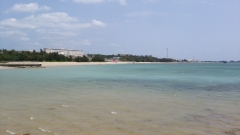
Initially that bigger Oura area, was supposed to be landfilled first but it was found even piers cannot withstand minimum level of earthquake. MoD knew this fact in 2015 but had not revealed it until 2017.
Even US GAO (Government Accountability Office) and the think tank CSIS recently reported Henoko landfill construction is difficult to implement due to the technical issues.
It is possible that the project is terminated halfway for some reason but irreversible damages would be left together with grudge from locals. Some portion of the budget for relocation of Marine Corp. to Camp Schwab and Guam is spared by US Government. That means this project wastes not only Japanese tax payers’ money but Americans as well.
It has been done for the interests of the few. The few, you might know, are certain businesses and government people who want some gains from the project. One of major contractors of the project is Taisei Kensetsu Corporation, where third son of the former Prime Minister, Suga, works.
As long as the construction goes on, the contractors can gain profits until the termination. For the Marines, the current Futenma base can be used as long as possible. While the construction goes on, irreversible damage on the environment is being expanded.
5 This construction might deteriorate friendship between the two nations
You might say this issue is something to be handled by the Japanese government, and that it is not the responsibility of the US military. But that sounds very hypocritical. The US military is the one that uses the facility and up until now involved in designing of new runways and annexed facilities. The US government can stop that project and find another relocation site outside Okinawa.
If the US continues to attribute this to the Japanese government, it is just like what Japanese conservative politicians say when it comes to the “Comfort Women” issue: “The Japanese Imperial Army was not responsible for kidnapping women in Asia for sexual slavery for soldiers during the war period in the early 20th century, it was what outsourced local brothels did.” The US Congress disavowed such argument and made a resolution to demand that the Japanese government apologize for former comfort women in 2007.
Growing doubts about US commitment to Japan’s defense
In fact, the US military presence in Okinawa and even nationwide is becoming nothing but troublesome. More of us know that the US military presence no longer functions as defense or deterrence like in the Cold War era. China is said to be a new threat but we know that US-China relations have become more vital for your nation since China owns more US treasury bonds and buys more US goods than Japan does. China has become a much larger economy than Japan these days.
We can easily predict that the US would not help Japan even if China and Japan became involved in a dispute for some reason such as the territorial right to the Senkaku islands located in between sea border of Japan and China. The US cannot send troops to assist Japan fighting against the Chinese military because such action might cause great losses for your national interests. China also played a big role in negotiating with North Korea. China is vital for US foreign policy.
Current ongoing crisis in Ukraine revealed US reluctance to help its ally. US announced that they would not send troops to help Ukraine from Russian invasion although US signed the security assurance memorandum with Ukraine in 1994 and just before the invasion started, US claimed that it would not stop Ukraine from joining NATO members. Ukraine military once did joint military exercise with the US military so Ukraine expected that US and NATO allies would send troops and set no-fly zone over Ukraine like they did in Yugoslavia 1990's but such thing never happened.
US military no longer functions even as deterrent forces.
Military experts and even former US military officials say that the biggest reason that the US military forces stay in Japan is to cut cost of their own because Japan provides host nation support fund, which we call “Sympathy Budget” that accounts for more than 70% of total expense for the US bases in Japan. There are more than 130 facilities of US military in Japan. Most of the troops are stationed at 30 facilities in Okinawa prefecture that accounts for 1 % of total of Japan’s territory and population.
During Vietnam War, it was a transit point to transport soldiers, military weapons and equipment. Now there is no strategic importance. How many of US congressmen and senators knows Okinawa? Is this place worth keeping bases in?
Recently China increased military power significantly so Okinawa, where several major bases are concentrated, now have become very vulnerable to the attack from China. Okinawa is obviously within China’s missile range. Once the dispute occurs, China can shoot missiles to destroy runways in Okinawa before any plane take off. Military strategists claim it is better to disperse bases in Asia-Pacific in order to counter the military threat from China. Eggs in a bucket can easily be broken.
In addition, like Russia, China possesses nuclear arms. As for what is going on in Ukraine, US could not get involved in the war against Russia because it wants to avoid the nuclear war.
We are sure that's the same case for the war against China.
Deploying your military so much in our country, especially Okinawa is just causing growing distrust against your country. I believe the Okinawa issue presents the perfect timing for your nation to rethink its military deployment in Japan in order to improve the relationship between the two nations. Constructing a base on reclaimed land in the Henoko sea is the worst possible idea.
The image of America is getting worse
US military presence functions to apply American influence on our nation. Yes, it did work that way but you really have to know this may be working negatively. The image of your country itself is no longer positive like in the past. In other words, the US is no longer a powerful land of dreams, nor is it any longer a role model for us.
One example of this can be seen in a recent best-selling book on your country’s poverty issue. The title of the book is “Rupo Hinkontaikoku America” (Report, Poverty Superpower, America). It was written by a Japanese journalist, TSUTSUMI Mika. The book describes how Americans are struggling with poverty in a plutonomy society and explains how Japan should not follow suit.
We know that a lot of young Marine troops stationed there come from poor families that cannot afford college education and have problems like domestic violence. They join the Marines by system, so called, Poverty Draft. That is why they cause troubles with Okinawa locals.
In addition, four years of Trump administration proved disparity among your nation. Although Trump lost in last year’s presidential election. 74 million Americans voted him, record number among sitting presidents. His comments during the administration delivered very negative images of America to Japanese citizens. We expect someone like him would be reelected in the near future, which is disappointing me, who learnt decency of America.
6 Your Servicemen & women and American residents are facing hostility in Okinawa
In September 2019, US Marines faced apparent resistance from locals and activists. citizens blocked port entry of US Marine vehicles carrying a boat for training. The port was located in Motobu town, 30 minute drive from Henoko and the boat was supposed to be shipped to nearby island.
Young military servicemen and women had to hear yelling from protesters and waited inside the vehicle for hours without air condition. The Marine vehicle was trying to enter the port to unload the boat to use for training on the sea.
Even port workers were standing at the entrance as human shield. The workers oppose military use of the port because they want to allow only civilian use. After 10 hours of sit-in protest, Marine vehicle with the boat on a trailer had to leave the port to go back to Camp Schwab.
I was there joining the sit-ins and talked with servicemen and woman. They seemed very unhappy having such conflicts. They should feel like being deployed on enemy line, not in allied nation.
Recently I met an American woman who manages a cheese shop “Little Greek Kitchen” at Plaza House Shopping Center in Okinawa. She was interviewed by Japan’s national television station NHK, and said that she did not want to be recognized as US military affiliated because reputation of US military has been very bad. She welcomes anyone regardless of nationality or what organization they belong to.
At the Camp Schwab gate, every day they have to see the protesters’ civil disobedience act and in many times being yelled at and called names. They never feel welcome. I do not think they feel honored to serve Marine Corp. as long as they are stationed in Okinawa.
Just next to Camp Schwab personnel entry gate is construction vehicle gate where every weekday, protestors sit-in to block the construction vehicles so that less vehicles could get in and delay the construction.
In Abu and Shiokawa ports located on the oppsite side of the island, where soils for the reclamation is being transported from nearby mountains to Henoko, local protestors stand in front of trucks to slow the work.
Do you think this situation creates healthy relationship among US, Japan and Okinawa? Proceeding of such unnecessary and infeasible construction are just making things worse. It should be halted immediately for the friendship or for the time being, construction must be stopped for the review.
Current Japanese government is willing to continue this but the opposing parties announced the termination of the construction if they regain the governance of Japan since the local protest is growing bigger than ever and the construction is found to be infeasible. Even a former Defense Minister, Nakatani in the current ruling party claimed it should be stopped.
Moreover, COVID-19 pandemic delays the construction schedule in addition to the local resistance. In April 2020 the construction was halted for 2 months because the workers got infected. Camp Schwab service personnel got infected as well. More budget for the pandemic relief is required. We will soon meet with the serious budget shortage and chaos due to the pandemic.
7 Russia and China are watching what America is doing in Okinawa
The end of last year when new recruits came to Okinawa bases including Camp Schwab and they went out of the camp without wearing masks on their faces, the infection cases grew rapidly within the Okinawa island. Okinawa had to restrict business activities which damaged its local economy.
(Photo taken near the Camp Schwab fence on 27 December 2021, when mask wearing was mandated in Okinawa, actually still madated now)
At that time, Chinese foreign ministry spokesman claimed US is responsible for the widespread infection in Okinawa and other countries by not mandating mask on servicemen and women, so US should not lead the world's COVID-19 counter-measures though it prided themselves to be.
Russian President Vladimir Putin mentioned this Henoko new base construction issue in December 2018 and claimed doubts about Japan’s territorial sovereignty on northern territorial islands between Hokkaido and Sakhalin which currently Russia administered because the Henoko construction has proceeded even though local governor and local residents opposed the plan.
If Japan is a democratic sovereign state, that shouldn’t happen. Russia is worried if the islands were returned to Japan, US military bases might be placed just near the Japan-Russia boarder. The territory was never returned due to Japan’s too much dependency on US military.
Putin just recently brought up nuclear attacks in Hiroshima and Nagasaki as America's inhumane acts. He claimed that Japan should recall this attack as America's attack on Japan. He's watching what America is doing in Japan. Russians are interested in this issue so when the referendum was held in February 2019, journalists of Interfax Press came to report what is going on.
I was interviewed by them and was asked why Japanese conservatives support such US military base construction despite their nationalism. (The below photo is the Russian journalists interviewing beforementioned White House petition campaigner, Rob Kajiwara, Naha city, Okinawa, February 2019)
US claimed that democracy is the best system for humanity. So authoritarian regimes such as Russia and China are not good. But in Okinawa US seems to prove the reverse. As things like this go on, these nations would bring up Okinawa issues to counter US appeal of how great democracy is. Is that what you like?
As for practical solutions of this issue, I recommend your organization to review a proposal by a private think tank, The New Diplomacy Initiatives (http://www.nd-initiative.org/en/), which suggests removal of US Marine bases from Okinawa but instead, establishing joint Humanitarian Assistance/Disaster Relief (HA/DR) Corp. with Japan’s Self-Defense Force equipped with high speed transport vessels, which rotates around East Asia. It is cost-effective and able to contribute to security of the region more realistically.
Sincerely,
Stay Safe!
P.S.
Permit me for writing some awkward or grammatically incorrect phrases since I am not a native speaker of English.
22:31 Posted in Ecology, Japan News, Politics, Society, US-Japan relationship, USA issues | Permalink | Comments (0) | Tags: okinawa, military
15 June 2021
Don't send athletes to TOKYO, Dear Olympic organisers in the world
Dear Olympic Organisers in the world, who prepare for postponed 2020 TOKYO Olympics,
I, as a Tokyo resident want to deliver the message or warning to you.
"Don't send your athletes to TOKYO 2020 Summer Olympics in July to August ."
It is almost a month and a week until start of the Olympics amid COVID-19 pandemic.
I present 3 main reasons why holding this Olympics is not good.
- Tokyo is not in the mood for festival.
- Unethical Olympics
- Lack of medical resources
1. Tokyo is not in the mood for festival
It's been almost a year and half since the outbreak started. In Japan more than 10000 people died of COVID-19. Worldwide millions died of the virus infection. Life has been restricted. Since last year the state of emergency was declared 3 times in Tokyo. Bars and restaurants are ordered to close by 8PM and no alcohol is served. 2020 Tokyo Olympics was postponed to this year's summer.
This will go on until the nation is fully vaccinated, which might take another year. Many events related to the Olympics were cancelled. No festival and No excitement in the city. Everyone is wearing masks. Rather, opposition movement has been growing. Last month more than a hundred took to the street near the Olympic main stadium to call for cancellation of the Olympics.
Various opinion polls indicate majority of Japanese nationals want to either cancel or re-postpone the Olympics.
Athletes and their accompanying staff, and journalists who cover the venues will not be welcome by Tokyo citizens. As we are in midst of the pandemic, their activities are strictly limited. No tourism is allowed. People fear foreigners bring virus to the city and cause another clusters.
2. Unethical Olympics
If the Olympics is cancelled, the risk of spreading the virus would be avoided. But IOC want to go ahead for such risky event together with JOC and the government of Japan. For money?
Not only risk of spreading the virus but this Olympics has had some other unethical issues. One of the big issues was symbolised by resignation of former Chairman of JOC due to his sexist remarks. Then his position was replaced by a woman.
Olympics Athlete guideline tells athletes are not allowed to hug but condoms are provided to them.
The Japanese government has recently been asking schools to halt sports activities of students to avoid crowds.
Are these incosistent policies?
3. Lack of medical resources
Japan's vaccination rate is still very low compared to other advanced nations. Vaccination on elderlies has already started nationwide and is expected to complete by the end of July. But even at that point, majority of Japanese would not be vaccinated yet. Even when the Olympics is held, the vaccination should go on meaning many doctors and nurses would be needed. JOC requires 500 of nurses and doctors for the Olympics' 15000 athletes and 70000 accompanying staff and journalists while many people are desperate for vaccination and treatment by licensed doctors and nurses.
Health experts including Dr. OMI Shigeru, hired by the Japanese government claimed it is abnormal to hold the Olympics in such a period.
Recently people are dying at home not being admitted to hospitals due to the overcapacity.
Once the Olympics started, many people move out and gather to watch the games inside and outside the stadiums, that will cause another big clusters. Even you are vaccinated, new strings of coronavirus can possibly cause another infection. At this point there are still many unknown factors.
Athletes will be seen as disease carriers in Tokyo. Would they be happy staying in Tokyo? They might get another virus by interacting with other people and bring these to their homelands.
What you should do
Please reconsider the participation in this such risky sports event for the public health of your nation and the world.
Here in Japan, Tokyo Olympics is called "Operation Imphal" naming after a big fiasco by the Japanese army during second world war in which tens of thousands Japanese soldiers died of hunger in Imphal, India due to the lack of strategy and rationality.
Tokyo Olympics 2020 is the operation in which we can easily foresee the disaster.
Please don't send your precious athletes to such unhealthy venue!
Stay home and stay safe!
20:14 Posted in Health, Japan News, Society, Sports, Tokyo Life | Permalink | Comments (0) | Tags: covid-19, olympic






